It looks like you're using an Ad Blocker.
Please white-list or disable AboveTopSecret.com in your ad-blocking tool.
Thank you.
Some features of ATS will be disabled while you continue to use an ad-blocker.
share:
Note Dr. Carter Page's reference to "transnational criminal associates" and the calling out of the Obama administration. He's not messing
around.
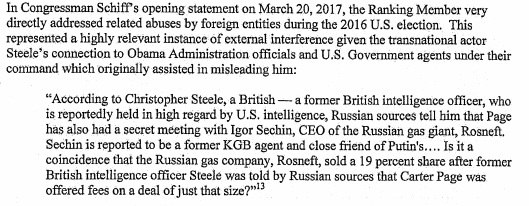
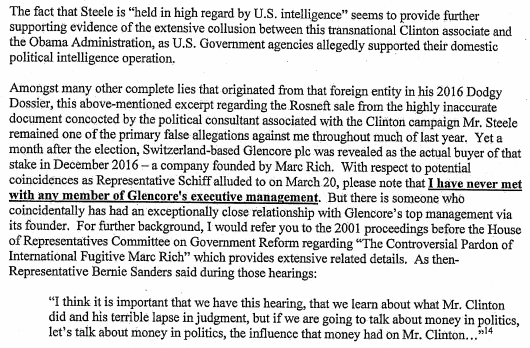
Ah, the sweet surrealness of the Glencore Marc Rich referenced in the 9/11 Commission Report (v2008) being brought up by Carter Page over a decade and a half following 9/11 and in regards to an investigation regarding Russia and Donald Trump is a truly What-the-Fay moment.
There are many WTF moments throughout Sater Saga but really, the overarching theme here is a criminal cabal who does really terrible # and has to launder the money from it, involving corrupt old banking institutions, etc. who have been laundering money for shady people a long time. Plus, we can't forget the likely trillions in gold that has to get laundered. Duh, people. There's a lot at stake here!
While this is more in line with the whole FISA debacle, it's worth pointing out this excerpt
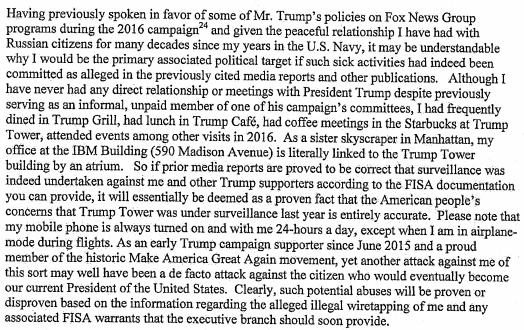
For those of you who understand how FISA "hops" work, his meaning will be crystal clear. All of Trump Tower was being surveilled, all through one FISA warrant on Page.
Here's where we start getting to the relevance to Sater.

Where this starts getting more clear is here directly from the Buryakov complaint [p. 13]

Reute rs
Further down in the article, we get this
The chances there would be some other person than Page, who was already identified as Male-1 officially, who passed on these binders with hidden small recording devices, is slim to none. So Page would be accurate in stating the officials in the Obama administration later decided to "out him" through James Wolfe and his relationship to journalist Ali Watkins at the time. WHY would be to use him as basis for the one FISA warrant they needed to surveil the entire Trump Tower building.
Where does Sater get involved in this whole Buryakov complaint? 2014, shortly before they arrest Buryakov and the two other spies.
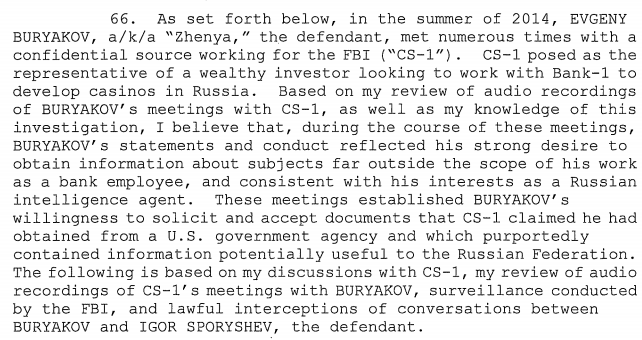



Ah, the sweet surrealness of the Glencore Marc Rich referenced in the 9/11 Commission Report (v2008) being brought up by Carter Page over a decade and a half following 9/11 and in regards to an investigation regarding Russia and Donald Trump is a truly What-the-Fay moment.
There are many WTF moments throughout Sater Saga but really, the overarching theme here is a criminal cabal who does really terrible # and has to launder the money from it, involving corrupt old banking institutions, etc. who have been laundering money for shady people a long time. Plus, we can't forget the likely trillions in gold that has to get laundered. Duh, people. There's a lot at stake here!
While this is more in line with the whole FISA debacle, it's worth pointing out this excerpt

For those of you who understand how FISA "hops" work, his meaning will be crystal clear. All of Trump Tower was being surveilled, all through one FISA warrant on Page.
Here's where we start getting to the relevance to Sater.

Where this starts getting more clear is here directly from the Buryakov complaint [p. 13]

Reute rs
The FBI eavesdropped on meetings involving Russian intelligence personnel in New York City, including a suspected spy posing as a trade representative, by hiding recorders in binders containing supposedly confidential information about the energy sector, U.S. prosecutors said. The hours of covert recordings from 2013 were disclosed in papers filed in Manhattan federal court on Tuesday in the case of Evgeny Buryakov, a Russian citizen who U.S. prosecutors say posed as a banker while participating in a Cold War-style spy ring. The Federal Bureau of Investigation’s eavesdrops enabled the agency to penetrate the workplaces of Russia’s foreign intelligence service, the SVR, and hear about Buryakov’s work for it, prosecutors said.
Further down in the article, we get this
According to prosecutors, in April 2012, Sporyshev met an undercover FBI employee posing as an analyst at a New York energy firm at an oil and gas industry conference. Over the next two years, they met to discuss the industry and other economic and political issues, prosecutors said, with Sporyshev providing gifts and cash for information. In 2013, the FBI employee began providing Sporyshev with the binders containing purported industry analysis he wrote, supporting documents, and “covertly placed recording devices,” prosecutors wrote.
The chances there would be some other person than Page, who was already identified as Male-1 officially, who passed on these binders with hidden small recording devices, is slim to none. So Page would be accurate in stating the officials in the Obama administration later decided to "out him" through James Wolfe and his relationship to journalist Ali Watkins at the time. WHY would be to use him as basis for the one FISA warrant they needed to surveil the entire Trump Tower building.
Where does Sater get involved in this whole Buryakov complaint? 2014, shortly before they arrest Buryakov and the two other spies.


Where the chronology of this flows is the following year to the Sater/Cohen/Rosov/IC Expert Trump Moscow deal, so be patient with me. I'm trying to
get there.

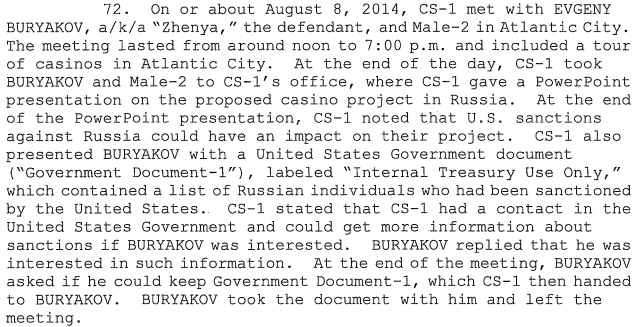






According to Wikipedia, Buryakov's arrest came down in January of 2015.
Buryakov
So,
2010 - Russian spies arrested and deported close to Hillary Clinton
2013 - Carter Page handing off binders to Russian spies in NY for the FBI
2014 - Sater likely touring casinos with Russian spies and giving them docs on sanctions and banks
2015 - Buryakov and 2 others arrested in Jan; Sater engages Rosov from Russia real estate development company I.C. expert to contact Cohen to represent Trump Org in licensing deal for Trump World Moscow Tower; these talks continue through June 2016
June 2016 - Trump Tower meeting where Paul Manafort seems to lead Jared Kushner and Donald Trump Jr into a trap meeting with Russian lawyer representing Prevezon Holdings in ongoing Magnitsky case regarding laundered money and giving Trump team documents with info provided by Fusion GPS; the same Fusion GPS working on "intelligence dossier" on Trump using Christopher Steele, former British agent - the dossier which in part prompts everything which follows
Messed up, right?
Buryakov
Evgeny Evgenievich Buryakov (Russian: Евгений Евгеньевич Буряков; born c. 1975) is a convicted Russian spy. He was arrested on January 26, 2015, charged with, and pleading guilty to, spying on the United States for the Russian Foreign Intelligence Service (SVR).[5][6] Buryakov was a New York-based Deputy Representative of Vnesheconombank,[7][8] Russia's state-owned national development bank.[9] Buryakov operated with non-official cover, and was thus not entitled to diplomatic immunity.[5] Buryakov conducted his espionage with the assistance of Igor Sporyshev, Trade Representative of the Russian Federation to New York, and Victor Podobnyy, an Attaché to the Permanent Mission of the Russian Federation to the United Nations.[5] In exchange for pleading guilty, Buryakov received a reduced sentence of 30 months in federal prison and fined $100,000. He was released early from prison on 31 March 2017 and deported from the United States six days later.[10][11]
So,
2010 - Russian spies arrested and deported close to Hillary Clinton
2013 - Carter Page handing off binders to Russian spies in NY for the FBI
2014 - Sater likely touring casinos with Russian spies and giving them docs on sanctions and banks
2015 - Buryakov and 2 others arrested in Jan; Sater engages Rosov from Russia real estate development company I.C. expert to contact Cohen to represent Trump Org in licensing deal for Trump World Moscow Tower; these talks continue through June 2016
June 2016 - Trump Tower meeting where Paul Manafort seems to lead Jared Kushner and Donald Trump Jr into a trap meeting with Russian lawyer representing Prevezon Holdings in ongoing Magnitsky case regarding laundered money and giving Trump team documents with info provided by Fusion GPS; the same Fusion GPS working on "intelligence dossier" on Trump using Christopher Steele, former British agent - the dossier which in part prompts everything which follows
Messed up, right?
So when I saw this I was pretty confused, because I was thinking Browder was a good guy - but now I'm thinking he's a bad guy? - but he was the guy
who lobbied for the Magnitsky Act which resulted in sanctioning Russians, so it's clear as mud I think.
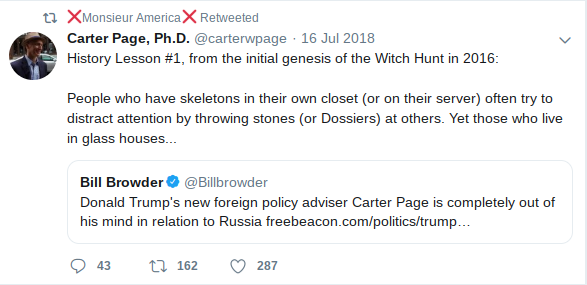
If anyone has any speculation, I'm all ears.
We know Fusion GPS was investigating Browder on behalf of Prevezon Holdings.
Where this becomes further muddied waters is a film I have yet to watch called Magnitsky Act: Behind the Scenes.
I mean, how much more bizarre can all of this get?
Magnitsky Act-Behind the Scenes
I'll try to see if I can locate it online and watch it this weekend and add notes/thoughts. Maybe I'll learn a few things on Browder which will make this clear, yet the fact the Russian lawyer Veselnitskaya was there at the Washington screening of its release makes it suspect.
So many things seemed to converge in June 2016, and it's interesting to note that Sater is likely to be the source "E" of Steele's so-called "intelligence dossier." Sergei Millian is purported to be the likely Source "D"

If anyone has any speculation, I'm all ears.
We know Fusion GPS was investigating Browder on behalf of Prevezon Holdings.
Where this becomes further muddied waters is a film I have yet to watch called Magnitsky Act: Behind the Scenes.
I mean, how much more bizarre can all of this get?
Magnitsky Act-Behind the Scenes
The Magnitsky Act – Behind the Scenes is a 2016 docudrama[5] feature film directed by Andrei Nekrasov, concerning the 2009 death in a Moscow prison cell, after 11 months in police custody, of 37-year-old Russian tax accountant Sergei Magnitsky.[6] In 2007, Magnitsky was hired by American-born British financier Bill Browder to investigate the government's seizure of three of Browder's Russian subsidiaries.[5] Discovering evidence of embezzlement, Magnitsky implicated two senior police officers in a tax rebate scam that used shell corporations[7] plundered from Browder's holdings to defraud the Russian treasury of $230 million.[8] Subordinates of those officials then arrested Magnitsky and charged him with the very crime he had exposed.[9] After initially presenting this widely accepted[5][7][8] narrative, The Magnitsky Act – Behind the Scenes proposes a counternarrative that, as The Guardian relates, "Magnitsky was not beaten while in police custody, and that he did not make any specific allegations against individuals in his testimony to Russian authorities."[8] By suggesting that Magnitsky was, as paraphrased by The New York Times, "an accomplice rather than a victim,"[5] the documentary has provoked international controversy.[5][8][10] The film takes its title from the Magnitsky Act, a bipartisan bill passed by the U.S. Congress and signed by President Barack Obama in 2012, designed to punish Russian officials allegedly responsible for Magnitsky's death.[11]
I'll try to see if I can locate it online and watch it this weekend and add notes/thoughts. Maybe I'll learn a few things on Browder which will make this clear, yet the fact the Russian lawyer Veselnitskaya was there at the Washington screening of its release makes it suspect.
The film's premiere was set for the European Parliament in Brussels on April 27, 2016. The event was organized by Finnish Green Party politician and MEP Heidi Hautala. In 2010, Hautala introduced her then-boyfriend Andrei Nekrasov to Bill Browder.[13] Now Nekrasov had made a film featuring extensive interview footage of Browder and challenging his single-handed control of the Magnitsky narrative.
At the eleventh hour, the premiere was canceled. The New York Times said threats of libel suits from Bill Browder accusing Nekrasov of defaming both him and Magnitsky had accompanied the cancellation.[5] Nekrasov blamed two last-minute interventions. The first was from MEP Marieluise Beck, unhappy because Nekrasov refused to remove her interview segment from his film. The second objection, which Nekrasov considered decisive, came from the film's principal sponsor, German public television broadcaster ZDF.[12][14] Along with its French public television subsidiary Arte, ZDF also shelved the film a few days before its scheduled telecast.[10]
The Magnitsky Act – Behind the Scenes premiered in Oslo, Norway in June 2016.
In June 2016, The New York Times reported that the film was "generating a furor."[5] On June 13, it was shown by invitation only[8] at the Newseum, a private museum in Washington, D.C. dedicated to the news industry.[5] The Washington Post called it part of "a campaign to discredit Browder and the Magnitsky Act."[7] Lawyers for Browder and Sergei Magnitsky's mother demanded that the screening be canceled.[5] The New York Times said showing it at the Newseum, which "sits on Pennsylvania Avenue in the shadow of the Capitol," was "especially controversial because it could attract lawmakers or their aides."[5] Besides congressional staffers, invitees included representatives from the United States Department of State and the White House National Security Council."[8]
The Daily Beast reported that Natalia Veselnitskaya, the Russian lawyer who met with Donald Trump Jr. four days earlier to criticize the Magnitsky Act,[16] paid for and attended the Newseum screening, to which Congressman Dana Rohrabacher, a senior member of the House Committee on Foreign Affairs, was invited to "try to recruit him to the Russian cause."[17]
When management refused to cancel the event, The Nation wrote that "the Newseum deserves great credit for sticking to its principles," adding that "the film provides a valuable service by asking how it is that American (and European) officials bought Browder's story without doing even the slightest due diligence. The American and European legislators who took Browder's version of events on faith now look credulous, at best."[10]
The Washington Post, however, editorialized, "The film is a piece of agitprop that mixes fact and fiction to blame Magnitsky for the fraud and absolve Russians of blame for his death."[7] According to The Post, "Mr. Nekrasov declares, 'Magnitsky wasn't a whistleblower. Magnitsky did not accuse any police officers. Magnitsky did not even investigate anything.' He adds, 'The young man died in a Russian prison. I do not believe it was murder. It was a case of negligence and the Russian system is to blame in many ways, but it wasn't murder; he wasn't murdered by the Russian state as Mr. Browder claims.' This is just what President Vladimir Putin and his honchos want the West to hear."[7]
The Post predicted, "The film won't grab a wide audience but it offers yet another example of the Kremlin's increasingly sophisticated efforts to spread its illiberal values and mind-set abroad. In the European Parliament and on French and German television networks, showings were put off recently after questions were raised about the accuracy of the film, including by Magnitsky's family. We don't worry that Mr. Nekrasov's film was screened here, in an open society. But it is important that such slick spin be fully exposed for its twisted story and sly deceptions."[7]
So many things seemed to converge in June 2016, and it's interesting to note that Sater is likely to be the source "E" of Steele's so-called "intelligence dossier." Sergei Millian is purported to be the likely Source "D"
Business Insider
Here's what Source D and E said according to this dossier:
There are excerpts from Glenn Simpson of Fusion GPS testimony regarding Sergei Millian in this Business Insider article.
You know who is also from Belarus, but often quoted in articles as being Russian? Oleg Deripaska, whom it was stated above as being pictured with Sergei Millian in June 2016 (below)
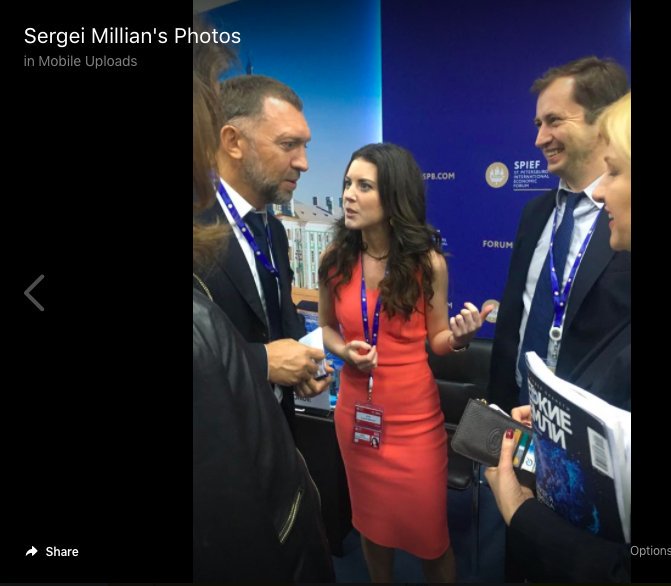
Here's what else BI reports in their article as far as Simpson's testimony regarding Millian
Further down in the BI article:
**Now another thing I forgot to mention above in my posts regarding Dr. Page that I'll just add now before I forget again:
I was really interested to read this in Page's transcript testimony in regards to his background/resume.
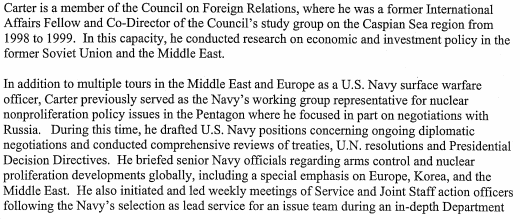
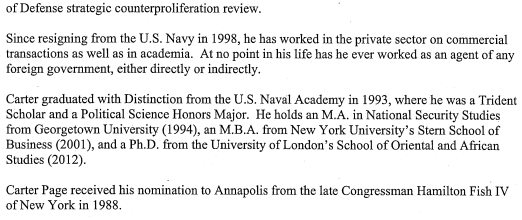
(At this point, one could not be blamed for throwing their hands up in the air and screaming at the mainstream media, "WHAT DO YOU DOOOO???" but I digress....)**
Here's another direct excerpt from Page testimony. He screams military Naval intelligence through and through.
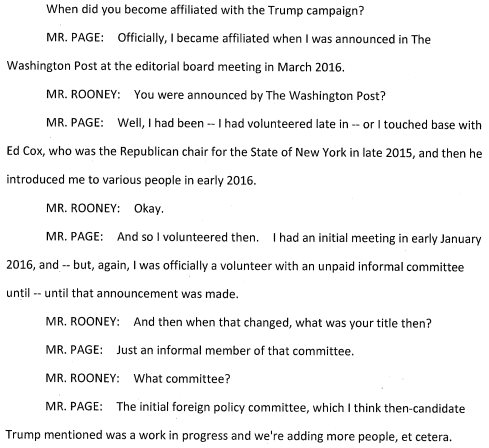
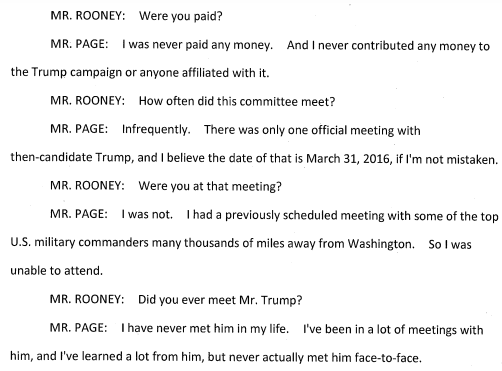
Here's what is important to note again leading up to how he ended up going in July 2016 to Moscow. I swear I'm going somewhere with all of this to then back to Millian/Rosov and the rest of it. Sigh. It's just a jumbled mess of handwritten notes and bookmarks on my computer and trying to put all of these pieces together in a cohesive format is a nightmare. So when I'm all over the place if you're interested enough, just roll with it. But I'll try to be concise as I hit certain dots in charting this mess.
Now note how he's going thousands of miles away at this point to a "meeting with some of the top U.S. military commanders." It's like what?
Then we skip to the July 2016 trip, the one in which the Politico correspondent in Russia attended and acted like his presentation was shoddy and actually seemed to have to do with Kazakhstan and his Russian was not great. Somehow, even though he communicated with Russian spies as Male-1.
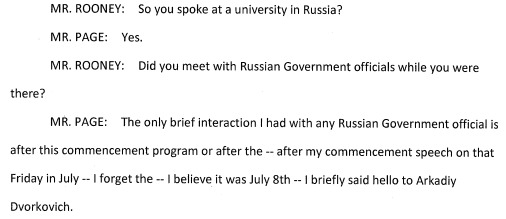
So he briefly speaks to Arkadiy Dvorkovich - another name yet to be chased down in this cluster of madness.
He then goes on to testify about how yada-yada some relationship with some Russian scholar he knew contacted another scholar whose father was Director of the New Economic School and so they had this standing invitation extended to Page to give a speech when he wanted. He goes on to testify regarding J.D. Gordon of the Trump campaign being the person he asked about if he could travel and give the speech.
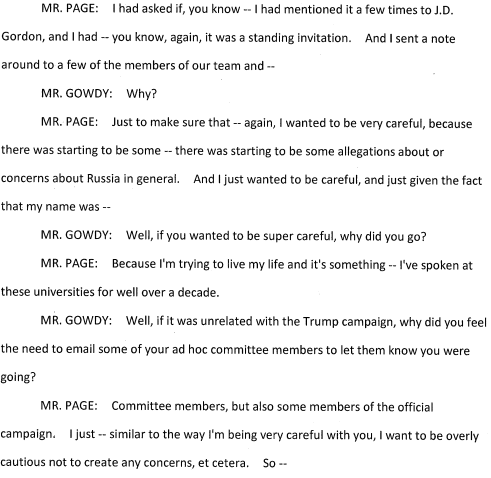
June 9: Trump Tower meeting presents dirt for sanctions relief; Cohen makes plans for trip to St. Petersburg Forum
June 14: WaPo reveals Russia hacked DNC; Cohen cancels plan for St. Petersburg trip
June 15: Guccifer 2.0 created
June 16-19: St. Petersburg forum (Putin does attend)
June 20: First Steele report, allegedly relying on Millian and perhaps Sater as two of the sources
July - Carter Page cashes in on a standing invitation to speak at the New Economic School in order to travel to Moscow
This was made out to be a big deal and used as a fact in FISA application on Page
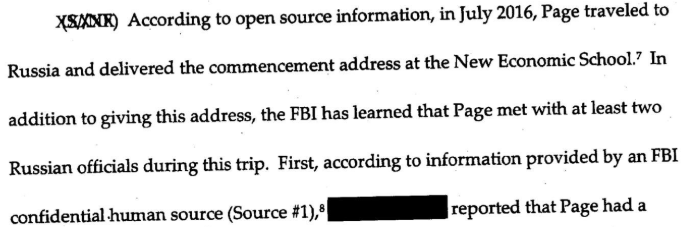
Here's what Source D and E said according to this dossier:
Source D, according to the dossier, had been "present" for Trump's alleged "perverted conduct in Moscow."
Source E, meanwhile," acknowledged that the Russian regime had been behind the recent leak of embarrassing e-mail messages, emanating from the Democratic National Committee (DNC), to the WikiLeaks platform," according to the dossier.
Source E also claimed that the Trump campaign and Russia had moles in the Democratic Party; that US-based "cyber operators" were coordinating attacks on the DNC and Clinton's campaign chairman John Podesta; and that these operators were being paid covertly via Russian "diplomatic staff" in "key" US cities via that Russia's emigre pension system.
Millian is believed to be a key source in a collection of memos Steele wrote between June and December of 2016 outlining Trump and his campaign members' alleged ties to Russian officials. The memos allege that Moscow and the Trump campaign worked hand in hand at points to influence the US election.
Millian, who changed his name when he arrived in the US from Siarhei Kukuts to Sergei Millian, founded the Russian-American Chamber of Commerce in 2006. He has described himself as an exclusive broker for the Trump Organization with respect to the company's potential real-estate dealings in Russia.
Simpson referred to the Russian-American Chamber as a "shadowy kind of trade group."
"Russians are known to use chambers of commerce and trade groups for intelligence operations," Simpson said.
Millian attended several black-tie events at Trump's inauguration. He told the Russian news agency RIA that he had been in touch with the Trump Organization as late as April 2016. He was also photographed at the St. Petersburg International Economic Forum in June 2016 with the Russian oligarch Oleg Deripaska, a longtime business associate of former Trump campaign chairman Paul Manafort.
There are excerpts from Glenn Simpson of Fusion GPS testimony regarding Sergei Millian in this Business Insider article.
There were also discrepancies in his resume, Simpson said in his testimony. "In one resume he said he was from Belarus and he went to Minsk State, and then in another he was from Moscow and went to Moscow State," Simpson said. "In one he said he worked for the Belarusian Foreign Ministry; in the other, he said he worked for the Russian Foreign Ministry."
You know who is also from Belarus, but often quoted in articles as being Russian? Oleg Deripaska, whom it was stated above as being pictured with Sergei Millian in June 2016 (below)

Here's what else BI reports in their article as far as Simpson's testimony regarding Millian
"As further time went on, we found [Millian] was connected to Michael Cohen, the president's lawyer," Simpson told the House committee. "Michael Cohen was very adamant that he didn't actually have a connection to Sergi, even though he was one of only like 100 people who followed Sergi on Twitter. And they — we had Twitter messages back and forth between the two of them just — we just pulled them off of Twitter."
Further down in the BI article:
Millian did not return a request for comment. Cohen told Business Insider earlier this month that the last time he spoke to Millian was in November 2016, days before the election, in which they exchanged "4-6 emails." He said he not have access to the emails offhand but offered to share their content later.
Millian has also worked with Rossotrudnichestvo, a Russian government organization whose "fundamental" goal is to familiarize "young people from different countries" with Russian culture through exchange trips to Moscow. The FBI has investigated whether Rossotrudnichestvo is a front for the Russian government to cultivate "young, up-and-coming Americans as Russian intelligence assets" — a theory Rossotrudnichestvo has strongly denied.
Simpson mentioned Millian's work for Rossotrudnichestvo in his testimony, noting that the organization had landed on the FBI's radar for allegedly conducting recruiting operations. Last January, however, Millian told Mother Jones he "never got any business with Rossotrudnichestvo." He did not respond to requests from Business Insider to clarify.
While Millian was not directly named in the version of the dossier that was published by BuzzFeed last January, he was "someone who was important," Simpson said.
**Now another thing I forgot to mention above in my posts regarding Dr. Page that I'll just add now before I forget again:
I was really interested to read this in Page's transcript testimony in regards to his background/resume.


(At this point, one could not be blamed for throwing their hands up in the air and screaming at the mainstream media, "WHAT DO YOU DOOOO???" but I digress....)**
Here's another direct excerpt from Page testimony. He screams military Naval intelligence through and through.


Here's what is important to note again leading up to how he ended up going in July 2016 to Moscow. I swear I'm going somewhere with all of this to then back to Millian/Rosov and the rest of it. Sigh. It's just a jumbled mess of handwritten notes and bookmarks on my computer and trying to put all of these pieces together in a cohesive format is a nightmare. So when I'm all over the place if you're interested enough, just roll with it. But I'll try to be concise as I hit certain dots in charting this mess.
Now note how he's going thousands of miles away at this point to a "meeting with some of the top U.S. military commanders." It's like what?
Then we skip to the July 2016 trip, the one in which the Politico correspondent in Russia attended and acted like his presentation was shoddy and actually seemed to have to do with Kazakhstan and his Russian was not great. Somehow, even though he communicated with Russian spies as Male-1.

So he briefly speaks to Arkadiy Dvorkovich - another name yet to be chased down in this cluster of madness.
He then goes on to testify about how yada-yada some relationship with some Russian scholar he knew contacted another scholar whose father was Director of the New Economic School and so they had this standing invitation extended to Page to give a speech when he wanted. He goes on to testify regarding J.D. Gordon of the Trump campaign being the person he asked about if he could travel and give the speech.

June 9: Trump Tower meeting presents dirt for sanctions relief; Cohen makes plans for trip to St. Petersburg Forum
June 14: WaPo reveals Russia hacked DNC; Cohen cancels plan for St. Petersburg trip
June 15: Guccifer 2.0 created
June 16-19: St. Petersburg forum (Putin does attend)
June 20: First Steele report, allegedly relying on Millian and perhaps Sater as two of the sources
July - Carter Page cashes in on a standing invitation to speak at the New Economic School in order to travel to Moscow
This was made out to be a big deal and used as a fact in FISA application on Page

edit on 26-6-2019 by ucanthandlethetruth because: fixed
edit on 26-6-2019 by ucanthandlethetruth because: fixed
Then we know from his continued testimony he was back in Russia in Dec of 2016 after Trump had won the election and another reference again to meeting
Arkadiy
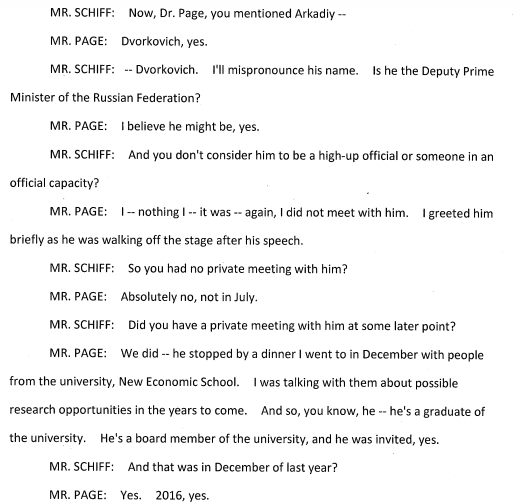
Then further down in the transcript of his testimony discussing the other Russian case Buryakov from 2013, we get some curious retractions and discussion.
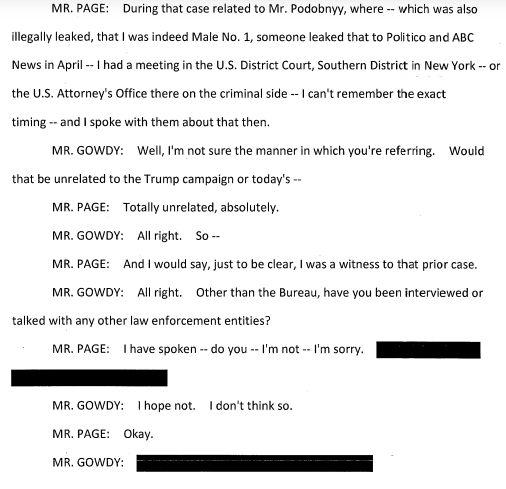
Then the clarification is made by Gowdy regarding the FBI then being the only law enforcement agency Page had spoken with, and this was confirmed. Note any other "agency" he could have spoken with relating to the "gray areas" alluded to and Page's confusion and needing clarification on the question. Page referring to "kind of overlap on this" is also curious.
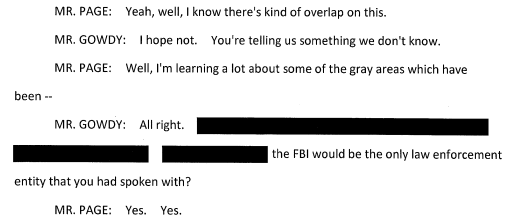
What Sater and Page have in common is this case regarding Buryakov, the arrested Russian spy from 2014, and Page being part of Trump campaign while Sater-Cohen continue to work on a Trump World Tower project with Rozov. What I forgot to note is BBC did an article in 2014 (before Buryakov arrest in Jan 2015) regarding building casinos in Crimea, which he considered Russia.
BBC News
So it is interesting to consider only a few months later in Aug 2014 is when it is likely Sater is giving Buryakov casino tours in Atlantic City.

Then further down in the transcript of his testimony discussing the other Russian case Buryakov from 2013, we get some curious retractions and discussion.

Then the clarification is made by Gowdy regarding the FBI then being the only law enforcement agency Page had spoken with, and this was confirmed. Note any other "agency" he could have spoken with relating to the "gray areas" alluded to and Page's confusion and needing clarification on the question. Page referring to "kind of overlap on this" is also curious.

What Sater and Page have in common is this case regarding Buryakov, the arrested Russian spy from 2014, and Page being part of Trump campaign while Sater-Cohen continue to work on a Trump World Tower project with Rozov. What I forgot to note is BBC did an article in 2014 (before Buryakov arrest in Jan 2015) regarding building casinos in Crimea, which he considered Russia.
BBC News
Russian President Vladimir Putin has presented a draft law to create a gambling zone in Crimea, now that the Kremlin has declared the Ukrainian territory part of Russia. By law casinos are restricted to four special areas in Russia, all a long way from Moscow. Now Crimea will become the fifth area, under Mr Putin's plan. So far only Azov City, a coastal area east of Crimea, has opened casinos.
So it is interesting to consider only a few months later in Aug 2014 is when it is likely Sater is giving Buryakov casino tours in Atlantic City.
What is one supposed to make of all this?
If I had only ONE question I was granted permission to ask Mueller as a journalist, it would be WHY his investigation and resulting report which was fairly broad in scope seemed so narrowly scoped?
Only two aspects of the Russian investigation were in his report: 1) the hacking of the DNC and the social media campaign; Internet research agency; 2) Trump Tower Moscow contacts/Carter Page contacts
The facts in which so-called "Russian" sources were feeding intel on candidate Trump through a former British intelligence officer being paid by a DC commercial research and strategic intelligence firm who was in turn being paid by Democrats, the opposing party, all while the FBI was taking this intel from the same former British intelligence officer is beyond imagination until now.
The fact Russians are skilled at spreading false intel is not part of Mueller's investigation into how Christopher Steele obtained his information from his sources and the resulting Russia investigation ended up in his lap. Yet the Mueller report overlooks the dossier entirely. In fact, the only time Dossier is mentioned in the Mueller Report is quoting a tweet from President Trump in 2018. The dossier is referred to as "Steele reporting."
After reading it, one wonders about all of the gaping holes as far as why Mueller only investigated what he did. He was also allegedly looking into the financial aspects of Trump's dealings with Duetschebank and Russians tied to Sater, but none of this is mentioned as far as being investigated in his report.
If I had only ONE question I was granted permission to ask Mueller as a journalist, it would be WHY his investigation and resulting report which was fairly broad in scope seemed so narrowly scoped?
Only two aspects of the Russian investigation were in his report: 1) the hacking of the DNC and the social media campaign; Internet research agency; 2) Trump Tower Moscow contacts/Carter Page contacts
The facts in which so-called "Russian" sources were feeding intel on candidate Trump through a former British intelligence officer being paid by a DC commercial research and strategic intelligence firm who was in turn being paid by Democrats, the opposing party, all while the FBI was taking this intel from the same former British intelligence officer is beyond imagination until now.
The fact Russians are skilled at spreading false intel is not part of Mueller's investigation into how Christopher Steele obtained his information from his sources and the resulting Russia investigation ended up in his lap. Yet the Mueller report overlooks the dossier entirely. In fact, the only time Dossier is mentioned in the Mueller Report is quoting a tweet from President Trump in 2018. The dossier is referred to as "Steele reporting."
After reading it, one wonders about all of the gaping holes as far as why Mueller only investigated what he did. He was also allegedly looking into the financial aspects of Trump's dealings with Duetschebank and Russians tied to Sater, but none of this is mentioned as far as being investigated in his report.
9.23.16
Carter Page is tossed out of the Trump campaign following this reporting by Yahoo News.
Yahoo News
The timing of what also happened in Sept also seems important. Actually, two days earlier.
Anthony Weiner
4 days after Carter Page leaves the Trump campaign, the leaked story (to the DailyMail paper) about Weiner's sexting to a teenage girl opens up arrest warrants for the FBI to seize Weiner's laptop. 9/27/16
The laptop which reopened the Hillary email investigation and likely played a hand in her losing the election to Trump, well, according to her.
There was one other pretty interesting account of what was happening behind the scenes as far as in the FBI around this time, which is still around the same timeframe Sater/Rosov/Cohen are working on this Trump World Tower Moscow development thing.
Around 2014-16, which keep in mind is the time that Ohr/Steele are running some kind of "let's try to cultivate Russian oligarchs to our side" operation which seems downright silly, here is what is happening at the FBI in regards to the difference between the NEW YORK (Sater) and WASHINGTON branch offices.
As I've only been able to find reported and distinguished by the Epoch Times, this wasn't something well-known, but I think it's pretty important.
Epoch Times
Come again?
LOL.
So here's the "account" I mention, which is only being reported by TruePundit, of what was happening behind the scenes at the FBI in regards to investigating Clinton for not only just the server and the emails, and all of that. But for the pay-to-play of the Clinton Foundation (likely involving Uranium One and Skolkovo) and being one of the worst intelligence leaks our nation has seen in its entire history.
Yes, as far as TruePundit reports - it was all bad around this time at the FBI. True Pundit
Hold on to your hats. Because if you don't recall this article from a publication considered NOT mainstream or credible back in Sept 2016 when this was written, it may open up some more eyes now. As far as the gravity of the situation.
While I can't paste all of this article and it's all worth reading, I do want to include what I find most important. They key FBI guy who was leading that investigation decided to retire in February of 2016. Whether he was threatened or he saw the writing on the wall, here is what TruePundit writes:
Carter Page is tossed out of the Trump campaign following this reporting by Yahoo News.
Yahoo News
The timing of what also happened in Sept also seems important. Actually, two days earlier.
Anthony Weiner
On September 21, 2016, the Daily Mail published an article claiming that Weiner had engaged in sexting with a 15-year-old girl from North Carolina, and devices owned by Weiner were seized as part of an investigation into this incident.[72][73][74] The report prompted a criminal investigation and Weiner's laptop was seized. Emails that were pertinent to the Hillary Clinton email controversy were discovered on the laptop; this prompted FBI Director James Comey to reopen that investigation 11 days before the 2016 US presidential election.[75] Hillary Clinton has cited Comey's decision as the reason why she lost the election to Donald Trump.[76]
4 days after Carter Page leaves the Trump campaign, the leaked story (to the DailyMail paper) about Weiner's sexting to a teenage girl opens up arrest warrants for the FBI to seize Weiner's laptop. 9/27/16
The laptop which reopened the Hillary email investigation and likely played a hand in her losing the election to Trump, well, according to her.
There was one other pretty interesting account of what was happening behind the scenes as far as in the FBI around this time, which is still around the same timeframe Sater/Rosov/Cohen are working on this Trump World Tower Moscow development thing.
Around 2014-16, which keep in mind is the time that Ohr/Steele are running some kind of "let's try to cultivate Russian oligarchs to our side" operation which seems downright silly, here is what is happening at the FBI in regards to the difference between the NEW YORK (Sater) and WASHINGTON branch offices.
As I've only been able to find reported and distinguished by the Epoch Times, this wasn't something well-known, but I think it's pretty important.
Epoch Times
Agents at the FBI headquarters in Washington later obtained their own search warrant and looked at the laptop in connection with its investigation into Clinton’s mishandling of classified information as State Secretary. But there was a notable difference between the Washington warrant and the New York one. The New York one read, in part: “Depending on circumstances, a complete review of the seized [electronically stored information] may require examination of all of the seized data to evaluate its contents and determine whether the data is responsive to the warrant.” The Washington one read, in part: “Law enforcement personnel will make reasonable efforts to restrict their search to data falling within the categories of evidence specified in the warrant.” That would suggest the New York agents could look at everything, while the Washington investigators worded its warrant in a way that restricted them to look only at data regarding the mishandling of classified information.
Come again?
LOL.
So here's the "account" I mention, which is only being reported by TruePundit, of what was happening behind the scenes at the FBI in regards to investigating Clinton for not only just the server and the emails, and all of that. But for the pay-to-play of the Clinton Foundation (likely involving Uranium One and Skolkovo) and being one of the worst intelligence leaks our nation has seen in its entire history.
Yes, as far as TruePundit reports - it was all bad around this time at the FBI. True Pundit
Hold on to your hats. Because if you don't recall this article from a publication considered NOT mainstream or credible back in Sept 2016 when this was written, it may open up some more eyes now. As far as the gravity of the situation.
Agents, along with the country, had just absorbed the troubling optics of Attorney General Loretta Lynch meeting privately with the husband of the investigation’s primary target on a jet tarmac just days earlier. And then hours after that debacle, the FBI announced Hillary would venture to its headquarters, in a matter of hours, to finally answer the bureau’s lingering questions about how she handled classified and top secret emails as secretary of state.
We say Clinton investigations, plural, because there were really two parallel inquiries that unfolded during the year-long FBI probe. There was the public email and home server investigation but agents were also building a pay-for-play criminal case involving Clinton, the Clinton Foundation and her husband, former President Bill Clinton. And that case was growing serious wings.
The FBI case agents and support personnel are forbidden to “go public” or comment on the record to share their frustrations and dismay because they each signed an unprecedented confidentiality agreement prior to signing onto work the Clinton investigation. Violating that agreement would likely cost them their careers and pensions. Regardless, True Pundit conducted interviews with FBI assets and support personnel who collectively painted a dark insiders’ portrait of the Clinton criminal probe which was commissioned to determine how Clinton and her aides handled, maintained, stored and ultimately botched some of the most sensitive information ever breached in the country’s 240-year history. True Pundit’s interviews and intelligence gathering on the Clinton investigation found:
- Allegations of pay-for-play involving the Clinton Foundation were not properly vetted, ultimately white washed
- FBI agents were blocked from serving search warrants to retrieve key evidence
- Attempts to secure Clinton’s medical records to confirm her head injury were sabotaged by FBI Director James Comey
- FBI agents were not allowed to interrogate witnesses and targets without warning
- Clinton and aides were provided special VIP accommodations during interviews
- FBI suspended standard investigative tactics employed in other probes
- FBI agents efforts were often blocked, suppressed by FBI, DOJ brass
- Agents lost faith that their superiors and DOJ wanted to see the case reach a grand jury
While I can't paste all of this article and it's all worth reading, I do want to include what I find most important. They key FBI guy who was leading that investigation decided to retire in February of 2016. Whether he was threatened or he saw the writing on the wall, here is what TruePundit writes:
John Giacalone was the supervisor of the bureau’s National Security Branch and also the FBI brains and genesis behind the Clinton email and private server investigation. He first approached Comey in 2015 for the green light to probe how the former secretary of state operated her private email server and handled classified correspondences. Rumors had been swirling in intelligence circles. Once approved, Giacalone spearheaded the investigation, and helped hand select top agents who were highly skilled but also discreet. Many of those agents were concerned when Giacalone abruptly resigned in the middle of the investigation. FBI insiders said Giacalone used the term “sideways” to describe the direction the Clinton probe had taken in the bureau. Giacalone lamented privately he no longer had confidence in the direction the investigation was headed. He felt it was simpler to quietly step aside, walk away instead of fight to keep the investigation on its proper track. Giacalone was a true heavyweight agent at FBI. In fact, he likely should have been running the entire show. His pedigree included running and creating FBI divisions in New York, Philadelphia, Washington D.C. and even serving as deputy commander in the Iraqi theater of operations. But in the midst of the Clinton investigation, Giacalone handed the bureau his retirement papers in Feb.
In late 2015 through January 2016, Giacalone shared the frustration of many agents who were perturbed about one lingering issue: When was the FBI going to interview Hillary Clinton?
By June, that frustration had reached a boiling point, largely fueled by Giacalone’s resignation months earlier. Frustrated FBI personnel were beginning to question the pace of the case and believed their intelligence gathering and analysis were beyond strong enough for a referral to the Justice Department in early 2016, sources said. Agents were left to wonder if their dogged research would ever see public eyes. There was a fear creeping into the case that perhaps the investigation was being politicized, that FBI and DOJ brass were trying to run out the clock, or “slow-walk” the case, on what should be considered an easily warranted criminal indictment prior to November’s general election.
Suddenly, Giacalone’s retirement in Feb. was starting to make more sense to FBI grunts who didn’t have the seasoning and street smarts of the retired New Yorker to digest the landscape, months prior, of the probe’s downward trajectory
“The window here has almost closed,” a federal law enforcement source told True Pundit in June. “Clinton should have been interviewed months ago. There is no longer enough time to refer it to DOJ, vet the case with AUSA’s (Assistant US Attorney’s), the AG and her staff, prepare the case, call a Grand Jury, and put the case on.”
Officials in June reiterated that all those elements in the legal process, if expedited without delays or legal snags, would put a grand jury decision to indict in late September or October, just weeks before the election.
“Can you imagine the uproar if she was arrested weeks before the election?” a federal law enforcement source said. “There was a window we were shooting for and we could have made it but everything is so slow now. I mean, she hasn’t even been interviewed. It’s incredible.”
Agents, again, had been trying to interview Clinton since about Dec. 2015 but approval within the bureau has been often delayed, sources said. Agents said the case was running smooth under Giacalone but once he exited, strange things started happening. For starters, in early April Comey said he would personally interrogate Clinton in the coming days about her private server and email use. Days passed. Then weeks. Then months. Comey still had not interviewed Clinton or even allowed her to be interviewed by anyone in the FBI, despite numerous requests. Comey was quickly losing the trust of his frustrated subordinates.
Agents at first thought Comey was joking when he said he would personally interrogate Clinton, who at the time was locked in in a death match to win the Democratic nomination against Sen. Bernie Sanders. Then, when they realized Comey actually made these statements publicly, a wave of dismay quickly built among rank and file FBI.
“He doesn’t know the case well enough to interview witnesses or targets,” a FBI source said. “It makes no sense. It could ruin the case or any case.”
It would be three months later, finally in early July of 2016 that Comey would arrange to have Clinton and Co. interviewed.
Clinton arrived with her legal entourage in tow. Attorneys David Kendall, Katherine Turner, Heather Samuelson, and Cheryl Mills flanked Clinton. On the government side of the conference room: FBI Section Chief Peter Strzok, David Laufman from the Justice Department, two unnamed DOJ representatives as well as the two confidential FBI agents conducting the interview.
Following the interview, word quickly spread through FBI circles that Mills was permitted to represent Clinton as part of her legal team during the session. Mills served as Clinton’s counsel and chief of staff at State. But some agents immediately thought news of her presence at the table had to be a simple mistake. There was little chance she could be allowed to sit in on an interview with the target of a criminal case, when Mills herself was a case witness and also considered a potential target. It made no sense.
“What the hell was she doing there and who allowed this?” a FBI source fumed.
What did it mean? To seasoned law enforcement agents, Mills’ presence meant the Big interview with Clinton was part of a dog-and-pony show for the media and American public. No legitimate FBI interview would allow another suspect in the same case to sit in on the supposed interrogation of another criminal target. Ever. Case agents realized they had been played. Their earlier fears about FBI brass tampering in the Clinton case were being quickly realized.
“This wasn’t a legitimate interrogation,“ a FBI source said. “It was more of a proffer passed off to the media as a tough criminal interview so the public would think she (Clinton) was being grilled.”
According to the FBI’s 302 report detailing her interview and the bureau’s general report of the email investigation, Clinton could not “recall” the answers to 27 different questions about her private email server and did not “remember” details of her emailing and classification habits at least another 12 times. But those were the numbers released just for public consumption. Agents said during the interview, Clinton didn’t remember details for dozens more questions and scenarios not detailed in the declassified 302. How do you cross examine someone with amnesia? Or purporting to have amnesia? You simply can’t. It was a frustrating exercise for agents and the team working the Clinton case. If nothing else, agents thought Clinton could perhaps provide bogus answers to some of the questions and perhaps set herself up for possible violations of 18 U.S.C. Sec. 1001, making false claims to government agents, a felony charge which could perhaps be used as leverage after an indictment during a possible plea. That went out the window as well with the amnesia drama.
So in 2015 when Sater is working with I.C. Expert/Rosov to engage Cohen on this Trump World Tower thing, the FBI NY office is getting upset their Clinton investigation is going nowhere fast.
While True Pundit's account may seem crazy, and the timing of it being published in Sept 2016 leading up to the 11/6 election date made most people
shrug it off as "fake news."
But the strange thing is the story being the True Pundit journalist. That's not the point here, so while I'll touch on it soon to explain his level of credibility, first let me add this last excerpt from that article.
Because of Clinton's claims of a head injury and amnesia during her FBI interview, the FBI agents in NY thought well, we can get her medical records. I'm summarizing parts of the article. Then this took place allegedly.
So here is what is interesting about True Pundit. As reported by BuzzFeed News last year:
BuzzFeed News
Further down
The journalist writing under the pseudonym "Thomas Paine" then responded in kind to BuzzFeed's article which stated he was Michael Moore, by writing his own article on True Pundit all about it.
True Pundit
Then further down
What stood out to me after I read Paine's book (or really Michael Moore's) is he calls this retaliation against the FBI through journalism "THE PLAN" and part of what he knows is that the intelligence agencies (at least many of them) knew Osama bin Laden was in Iran. And never did a thing about it. I don't want to get us off track on that but Kish Island is where Robert Levinson disappeared in Iran in 2007.
Anyway, while I leave it up to you to decide, I do find True Pundit fairly credible.
But the strange thing is the story being the True Pundit journalist. That's not the point here, so while I'll touch on it soon to explain his level of credibility, first let me add this last excerpt from that article.
Moreover, once agents had access to the completed 302 report detailing what precisely went down during the Clinton interview, agents thought it might be missing pages or portions because it failed to contain key ingredients. There were not questions about the Clinton Foundation and what role it played in her setting up and employing her private server. There were no questions about Clinton’s emails and her aides’ thousands of emails to and from Clinton Foundation personnel. The FBI’s interview, Agents criticized, also never truly pressed Clinton with follow up to her answers. Agents and DOJ officials never presented her with contradictory evidence to counter her claims and statements. Clinton, they summarized, was given a free ride. Any other person would have been skewered for hours, or brought to tears, or simply muscled into contemplating a future plea. They had the dirt on her to do just that but chose to let her off easy, seemingly sensitive to her alleged medical woes. These tough questions were, again, off limits.
Because of Clinton's claims of a head injury and amnesia during her FBI interview, the FBI agents in NY thought well, we can get her medical records. I'm summarizing parts of the article. Then this took place allegedly.
Plans to obtain Clinton’s medical records leaked up the chain of command and by Monday evening Comey issued a directive ultimately putting the cabash on what otherwise seemed like a smart investigative grab. No one in the FBI was permitted to obtain Clinton’s official medical records. No exceptions. The directive set off chaos within the bureau, especially on the heels of the fake criminal interview with Clinton just days earlier. This wasn’t the first time FBI brass had blocked agents from obtaining Clinton-related intelligence crucial to the probe. Now, it was a pattern. How were agents supposed to work the case to drill holes in Clinton’s interview defenses and tactics without confirming she had a severe head injury?
So here is what is interesting about True Pundit. As reported by BuzzFeed News last year:
BuzzFeed News
Since launching the site in June 2016, Paine and True Pundit have carved out a unique niche among the news grifters capitalizing on our conspiracy-laden, deeply polarized information environment. As New York magazine noted in a piece debunking two True Pundit stories, Paine is “fluent in the paranoid language of 2016 social media.” Paine combines the use of a pseudonym with almost exclusive use of anonymous sources to establish the persona of a deeply connected reporter with a vast network of FBI, law enforcement, and government sources. As with the Page story, he adds false or conspiracy-filled claims to real events or documents in order to create the impression of being rooted in fact. And the retweets, traffic, and supporters have rolled in.
Further down
The question of who’s behind True Pundit has itself become the source of wild theories. Viral #resistance tweeter Seth Abramson dedicated an 84-tweet thread to True Pundit and Paine. Abramson argued that True Pundit was being fed information by “a cadre of pro-Trump FBI agents and intel officers — some active, some retired — [who] conspired to swing the election to Trump.” (Another Twitter user investigated the account and concluded it’s a fake persona concocted by the Trump campaign’s social media team.)
The journalist writing under the pseudonym "Thomas Paine" then responded in kind to BuzzFeed's article which stated he was Michael Moore, by writing his own article on True Pundit all about it.
True Pundit
My name is Michael Moore. No, not the Lib movie guy Michael Moore (Now you understand why I use a pseudonym) I have won numerous awards in journalism, including the Gerald Loeb Award in 1996. None of that much matters in the scope of things — or life in general — but being nominated for Pulitzer Prizes in your 20s is something I can tell my grandkids about. And the Loeb speaks for itself. A Certified Fraud Examiner too, I worked for Citi running its anti-money laundering Ops in three states. Until the FBI ruined that career.
But it is time for Thomas Paine to go public. The good guys don’t hide, as a Congressman told me this weekend. Especially after being terrorized by the FBI.
These are the times that try men’s souls, the real Thomas Paine penned. Especially when a dozen FBI agents are pointing high-powered rifles at my children during an early-morning search warrant raid.
My boys. Then eight and twelve. With M-4 carbine rifles pointed at their wet heads just before getting on the school bus. One slip of a finger and poof, they’re dead. My wife too. Courtesy of cowboys from the FBI.
Then further down
BECAUSE as a contractor I knew too much. And I still know too much. And it is almost time to tell the world all about it. We are working on a book that will detail why the FBI turned on me. The reasons are hard to stomach but I am safer if all know. While the FBI was tossing my house and asking me dumb questions the wheels in my head were already years ahead of those chaotic moments. My wife and boys were in tears but I was already thinking how this could play out.
What stood out to me after I read Paine's book (or really Michael Moore's) is he calls this retaliation against the FBI through journalism "THE PLAN" and part of what he knows is that the intelligence agencies (at least many of them) knew Osama bin Laden was in Iran. And never did a thing about it. I don't want to get us off track on that but Kish Island is where Robert Levinson disappeared in Iran in 2007.
Anyway, while I leave it up to you to decide, I do find True Pundit fairly credible.
Now back to Sergei Millian. Source D, sometimes quoted as Source E, also, but I think E is Sater. Hold that thought.
We know from the Mueller report that George Papadopoulos from the Trump campaign had his first contact with Sergei Millian on July 15, 2016 contacting him via LinkedIn. He introduced himself to Papadopoulos as President of the NY-based Russian American Chamber of Commerce and said he had direct access to the top hierarchy in Russian politics.
Papadopoulos then proceeded to meet Millian in NYC on July 30 and Aug 1, 2016. He then invited him to two conferences, but Papadopoulos attended neither one. One was to be held in Moscow in Sept 2016.
Here is the rest of the Mueller report paragraphs detailing the rest of the Papadopoulos-Millian contacts.
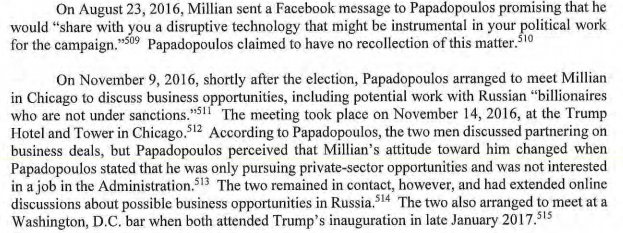
So the question becomes why does Sergei Millian, the likely leak as one major source for the Trump-Russia-Steele-intelligence-dossier (the scandalous completely unverifiable "pee" claims, then contact a Trump campaign person in the summer of 2016 and invite them to attend conferences?
There is a big difference in what Source D and Source E are stating in the dossier, so let's call that out specifically now.
While some say Millian is both Source D and E, I don't think Source E makes sense for Millian. They are described as being "an ethnic Russian close associate of US Republican presidential candidate Donald Trump." I think it makes more sense fitting Sater. Let's see what it says. Dossier Link
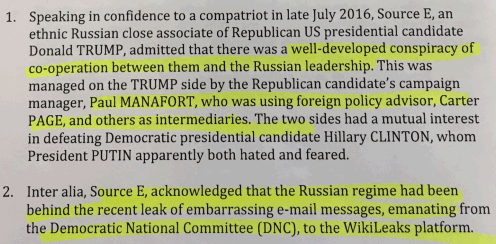
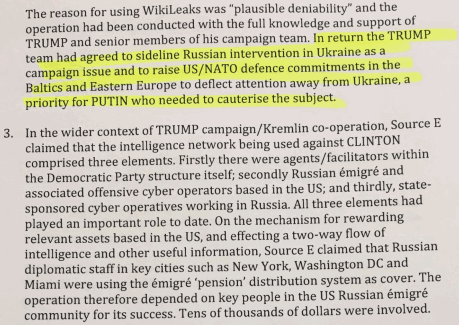
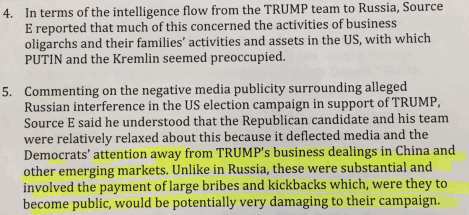
What does Source D say in the dossier?
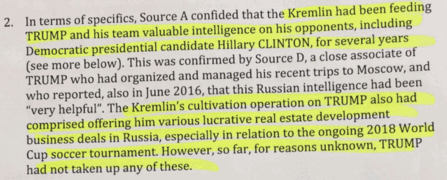
I'm not going to bother posting the other Source D allegations which were renting the hotel room the Obama's stayed in 2013, and most everyone knows the rest of it.
The Moscow Project who says they are plotting all of this out think Source D and E could be the same person but it doesn't make a lot of sense.
The dates of who reported what when is also interesting.
Source D's little tidbits of info for Mr. Steele came in the report in the dossier dated June 20, 2016 and Source E's came in the report dated July 19, 2016 and Source E's info is reportedly coming through a confidant, not himself directly.
We know from the Mueller report that George Papadopoulos from the Trump campaign had his first contact with Sergei Millian on July 15, 2016 contacting him via LinkedIn. He introduced himself to Papadopoulos as President of the NY-based Russian American Chamber of Commerce and said he had direct access to the top hierarchy in Russian politics.
Papadopoulos then proceeded to meet Millian in NYC on July 30 and Aug 1, 2016. He then invited him to two conferences, but Papadopoulos attended neither one. One was to be held in Moscow in Sept 2016.
Here is the rest of the Mueller report paragraphs detailing the rest of the Papadopoulos-Millian contacts.

So the question becomes why does Sergei Millian, the likely leak as one major source for the Trump-Russia-Steele-intelligence-dossier (the scandalous completely unverifiable "pee" claims, then contact a Trump campaign person in the summer of 2016 and invite them to attend conferences?
There is a big difference in what Source D and Source E are stating in the dossier, so let's call that out specifically now.
While some say Millian is both Source D and E, I don't think Source E makes sense for Millian. They are described as being "an ethnic Russian close associate of US Republican presidential candidate Donald Trump." I think it makes more sense fitting Sater. Let's see what it says. Dossier Link



What does Source D say in the dossier?

I'm not going to bother posting the other Source D allegations which were renting the hotel room the Obama's stayed in 2013, and most everyone knows the rest of it.
The Moscow Project who says they are plotting all of this out think Source D and E could be the same person but it doesn't make a lot of sense.
The dates of who reported what when is also interesting.
Source D's little tidbits of info for Mr. Steele came in the report in the dossier dated June 20, 2016 and Source E's came in the report dated July 19, 2016 and Source E's info is reportedly coming through a confidant, not himself directly.
And if you're so royally confused by this point, I'm sorry.
So if you want to look at it again this way with dates, it looks like this:
2013: Trump is going to Moscow for Miss Universe pageant; C. Page is helping the FBI unmask Russian spies with recording devices; Clinton's world hasn't crashed down yet with questions about servers and emails - she leaves as Sec of State
2014-16: Ohr/Steele are working on cultivating Russian oligarchs for information (is this part of the missing reports in the Steele dossier? - more detail below)
2014-15: Sater is giving casino tours in Atlantic City to Russian spies in Aug 2014 after BBC does article in Apr 2014 about Putin wanted to develop casinos in Crimea; Appears like the Clinton Foundation investigation was in full swing and there were FBI agents in NY who were expecting her to be brought in and interviewed in what they thought could be one of the worst leaks of intelligence in the nation's history but nothing happened; Trump and Clinton both announce candidacies; Sater engages Rozov to contact Cohen for Trump Organization licensing brand deal
Feb 2016: John Giacalone, FBI Supervisor National Security Branch and "brains and genius" behind Clinton email and private server investigations
All of this happens in June 2016
June 9: Trump Tower meeting presents dirt for sanctions relief; Cohen makes plans for trip to St. Petersburg Forum
June 12: First True Pundit article comes online using Thomas Paine pseudonym
June 14: WaPo reveals Russia hacked DNC; Cohen cancels plan for St. Petersburg trip
June 15: Guccifer 2.0 created; claims responsibility over Russian hackers
June 16-19: St. Petersburg forum (Putin does attend); Cohen was considering attending and Sater was helping to arrange it
June 20: First Steele report in dossier is #80 with no indication of where #1-79 are, but supposedly this started in June 2016 at Report #80; allegedly relying on Millian as Source D, and Sources A, B, C, and G
July: Carter Page cashes in on a standing invitation to speak at the New Economic School in order to travel to Moscow; Source E likely Sater (through a "confidante" shows up in Steele Dossier Report #2 which is actually #86 with no indication of why #81-85 are gone; Also Comey finally arranges for H. Clinton to come in for interview regarding classified information on private server/emails
July 15: Sergei Millian first contacts George Papadopoulos thru LinkedIn; but he allegedly is Source D in the Steele Dossier from the report dated June 20 about Trump's ties to Russia
July 22: WikiLeaks releases close to 20k emails from DNC
Sept 21: Through the teenager herself leaking to the DailyMail, the tabloid publishes an article regarding Anthony Weiner's sexting relationship with her, prompting outrage and FBI investigation
Sept 23: Yahoo news article on Carter Page "ties to Russia" prompts him to leave the campaign a few days later; Sept 23 is the same day we know from FBI vault records Anthony Weiner's devices ended up a "private security firm"
FBI Vault Hillary Clinton Files Part 30 of 31 p. 3

Sept 26: FBI seek search warrant on Weiner laptop seized; there was a distinct difference in the search warrant wording between the NY and Washington FBI field offices; NY being able to seize all data and Washington only seizing what was in scope of child pornography
So if you want to look at it again this way with dates, it looks like this:
2013: Trump is going to Moscow for Miss Universe pageant; C. Page is helping the FBI unmask Russian spies with recording devices; Clinton's world hasn't crashed down yet with questions about servers and emails - she leaves as Sec of State
2014-16: Ohr/Steele are working on cultivating Russian oligarchs for information (is this part of the missing reports in the Steele dossier? - more detail below)
2014-15: Sater is giving casino tours in Atlantic City to Russian spies in Aug 2014 after BBC does article in Apr 2014 about Putin wanted to develop casinos in Crimea; Appears like the Clinton Foundation investigation was in full swing and there were FBI agents in NY who were expecting her to be brought in and interviewed in what they thought could be one of the worst leaks of intelligence in the nation's history but nothing happened; Trump and Clinton both announce candidacies; Sater engages Rozov to contact Cohen for Trump Organization licensing brand deal
Feb 2016: John Giacalone, FBI Supervisor National Security Branch and "brains and genius" behind Clinton email and private server investigations
All of this happens in June 2016
June 9: Trump Tower meeting presents dirt for sanctions relief; Cohen makes plans for trip to St. Petersburg Forum
June 12: First True Pundit article comes online using Thomas Paine pseudonym
June 14: WaPo reveals Russia hacked DNC; Cohen cancels plan for St. Petersburg trip
June 15: Guccifer 2.0 created; claims responsibility over Russian hackers
June 16-19: St. Petersburg forum (Putin does attend); Cohen was considering attending and Sater was helping to arrange it
June 20: First Steele report in dossier is #80 with no indication of where #1-79 are, but supposedly this started in June 2016 at Report #80; allegedly relying on Millian as Source D, and Sources A, B, C, and G
July: Carter Page cashes in on a standing invitation to speak at the New Economic School in order to travel to Moscow; Source E likely Sater (through a "confidante" shows up in Steele Dossier Report #2 which is actually #86 with no indication of why #81-85 are gone; Also Comey finally arranges for H. Clinton to come in for interview regarding classified information on private server/emails
July 15: Sergei Millian first contacts George Papadopoulos thru LinkedIn; but he allegedly is Source D in the Steele Dossier from the report dated June 20 about Trump's ties to Russia
July 22: WikiLeaks releases close to 20k emails from DNC
Sept 21: Through the teenager herself leaking to the DailyMail, the tabloid publishes an article regarding Anthony Weiner's sexting relationship with her, prompting outrage and FBI investigation
Sept 23: Yahoo news article on Carter Page "ties to Russia" prompts him to leave the campaign a few days later; Sept 23 is the same day we know from FBI vault records Anthony Weiner's devices ended up a "private security firm"
FBI Vault Hillary Clinton Files Part 30 of 31 p. 3

Sept 26: FBI seek search warrant on Weiner laptop seized; there was a distinct difference in the search warrant wording between the NY and Washington FBI field offices; NY being able to seize all data and Washington only seizing what was in scope of child pornography
Oct 2016: Cohen sets up company Essential Consultants LLC and soon after began receiving large deposits from Columbus Nova, tied to Russian Viktor
Vekselsberg, the Fort Russ guy who was dining with the DNC back in 2010
Nov 8, 2016: (Election Day) Cohen begins communicating with Andrew Intrater, Vekselberg's cousin and founder of Columbus Nova
Politico
Here's where Sater gets involved.
Hard to imagine the exchanges between the two of them from Jan 5 to Feb 18 could have been about a story that hadn't yet been published. LOL. But remember they are childhood friends and have known each other for a very long time so it's pretty strange that Cohen seems to have turned on Trump and maybe Sater, at least on the surface.
So you read all of these articles regarding Sater and Cohen and their ties to Russia and their closeness to Trump and try to reconcile that and all of these events together with the fact Mueller's report doesn't seem to split much hairs over it all.
So I go back to the "bigger fish to fry" remark which was in regards to an article in Dec 2015 from ABCNews which upset Sater. They were reminding people again that Trump stated in a 2013 deposition he wouldn't recognize Sater if he were in the same room, and Sater wasn't happy about it and ranting to Cohen.
What do we know was happening amidst all of this? Sater was likely running down money laundering webs around the world, including Kazakhstan, Russia, Ukraine, and the U.S., among others, helping whomever he was truly working for, if anyone during this period... but he was sure still helping those with shady backgrounds work on real estate deals where money can be laundered or get sunk into it and disappear.
We'll get to that Rozov character next, during this Trump World Tower period everyone fusses over.
But Cohen rebukes Sater. He basically retorts like who-cares and Sater replies back about having "bigger fish to fry." Here is the exchange again, per the records quoted in this article.

Who has bigger fish to fry, as the expression means in this context, regarding work on a Trump Moscow deal??
But this is the connection I wanted to make - which took awhile to get there - is that leading up to this point in 2015 the NY FBI agents Sater has to have known for a long time are getting pissy Clinton isn't being interviewed, and investigations have been going on into national security/classified intelligence leaks regarding things like Uranium One of which we know Sater was tied into. And here they are towards the end of Dec 2015 having private exchanges with each other working on this Trump deal with Russians and Sater referring to having bigger fish to fry.
Who are Cohen and Sater working for? Is the matter of classified intelligence leak (and Clinton not being interviewed) turned into a military intelligence matter now, and Sater-Cohen are assisting them in running down this web using Trump's brand name?
Because it certainly looks like Bayrock-Trump brand was being used as a lure around the world for Sater to run operations and try to get shady characters to let him see into their money flows.
And Bayrock is the only company Trump was doing these licensing deals with in the 2000s. Even during the period 2008-10 when Sater seems to be "gone" from the scene and I can't find anything on him. This is during during the period Ablyazov-Khrapunovs) had fled Kazakhstan, Sater is gone, Bayrock is over, and Trump doesn't try to do any licensing deals with any other real estate developer we can find.
Isn't that odd?
Nov 8, 2016: (Election Day) Cohen begins communicating with Andrew Intrater, Vekselberg's cousin and founder of Columbus Nova
Politico
"They were working together so of course texted and called each other," a Columbus Nova spokesperson said in a statement. "This was all known and investigated, and wasn't even deemed worthy of being included in the special counsel's report.” Cohen told lawmakers earlier this year that he signed a $1 million contract — of which he only got about $416,000 — with Columbus Nova, whose largest client is Vekselberg’s Renova Group.
The plan was to “put together an infrastructure fund” that would be financed by overseas investors, Cohen testified. But he downplayed Vekselberg’s interest in the deal, telling Congress that the Russian oligarch was only a “minimal” investor in Columbus Nova when they started working together in January 2017.
Emails obtained by the FBI and described in the search warrant for the first time, however, show that Vekselberg met with Cohen and Intrater 11 days before Trump’s inauguration. At that gathering, the three discussed a lobbying group based in Moscow that promotes Russian business interests, called the Russian Union of Industrialists and Entrepreneurs.
And according to the court documents, Cohen also remained in touch with Vekselberg and scheduled a meeting with him in March 2017 at Renova headquarters — while Columbus Nova was still paying Cohen.
Here's where Sater gets involved.
The meeting was of interest to lawmakers because Cohen had met in late January of that year with his longtime acquaintance Felix Sater and the Ukrainian lawmaker Andrei Artemenko to discuss a Russia-Ukraine “peace plan” that would involve lifting sanctions on Russia. The FBI wanted to know whether Vekselberg was paying Cohen to promote the sanctions-lifting plan, which would have benefited the Russian oligarch. Vekselberg has been doing business in the United States since at least 1990, when he co-founded the conglomerate Renova Group as a joint U.S.-Russian venture.
No evidence has emerged of such a quid-pro-quo, and Columbus Nova has denied participating in anything related to a Ukranian peace plan. But the FBI did reveal some new details about the episode in the search warrants unsealed on Wednesday.
According to phone records investigators reviewed, “a call was exchanged” between Cohen and soon-to-be White House national security adviser Michael Flynn on Jan. 11, 2017, just days before Trump's inauguration. A New York Times report said Cohen had delivered the sanctions-lifting plan to Flynn, but Cohen later told lawmakers that he threw the plan in the trash and never delivered it to the White House.
The FBI also found that Cohen continued speaking to Sater, a Russian-born businessman who helped Cohen negotiate a Trump Tower Moscow deal during the election, well after the peace plan meeting. Records they obtained showed approximately 20 calls exchanged between them from Jan. 5, 2017 to Feb. 20, 2017. Sater on Wednesday told POLITICO he couldn't remember the exact substance of the calls but said they likely had to do with the New York Times’ story about the “peace plan” meeting, which was published on Feb. 19.
Hard to imagine the exchanges between the two of them from Jan 5 to Feb 18 could have been about a story that hadn't yet been published. LOL. But remember they are childhood friends and have known each other for a very long time so it's pretty strange that Cohen seems to have turned on Trump and maybe Sater, at least on the surface.
So you read all of these articles regarding Sater and Cohen and their ties to Russia and their closeness to Trump and try to reconcile that and all of these events together with the fact Mueller's report doesn't seem to split much hairs over it all.
So I go back to the "bigger fish to fry" remark which was in regards to an article in Dec 2015 from ABCNews which upset Sater. They were reminding people again that Trump stated in a 2013 deposition he wouldn't recognize Sater if he were in the same room, and Sater wasn't happy about it and ranting to Cohen.
What do we know was happening amidst all of this? Sater was likely running down money laundering webs around the world, including Kazakhstan, Russia, Ukraine, and the U.S., among others, helping whomever he was truly working for, if anyone during this period... but he was sure still helping those with shady backgrounds work on real estate deals where money can be laundered or get sunk into it and disappear.
We'll get to that Rozov character next, during this Trump World Tower period everyone fusses over.
But Cohen rebukes Sater. He basically retorts like who-cares and Sater replies back about having "bigger fish to fry." Here is the exchange again, per the records quoted in this article.

Who has bigger fish to fry, as the expression means in this context, regarding work on a Trump Moscow deal??
But this is the connection I wanted to make - which took awhile to get there - is that leading up to this point in 2015 the NY FBI agents Sater has to have known for a long time are getting pissy Clinton isn't being interviewed, and investigations have been going on into national security/classified intelligence leaks regarding things like Uranium One of which we know Sater was tied into. And here they are towards the end of Dec 2015 having private exchanges with each other working on this Trump deal with Russians and Sater referring to having bigger fish to fry.
Who are Cohen and Sater working for? Is the matter of classified intelligence leak (and Clinton not being interviewed) turned into a military intelligence matter now, and Sater-Cohen are assisting them in running down this web using Trump's brand name?
Because it certainly looks like Bayrock-Trump brand was being used as a lure around the world for Sater to run operations and try to get shady characters to let him see into their money flows.
And Bayrock is the only company Trump was doing these licensing deals with in the 2000s. Even during the period 2008-10 when Sater seems to be "gone" from the scene and I can't find anything on him. This is during during the period Ablyazov-Khrapunovs) had fled Kazakhstan, Sater is gone, Bayrock is over, and Trump doesn't try to do any licensing deals with any other real estate developer we can find.
Isn't that odd?
Let's look at how Sater played into the Trump World Tower Moscow development chronology.
Trump Tower Moscow Docs
Trump Tower Moscow Docs Rozov
9/25/15 - Cohen emails Sater a Trump World Moscow PDF with architectural designs of the planned skyscraper
9/28/15 - Dmitry Chikhikov emails Sater (redacted)
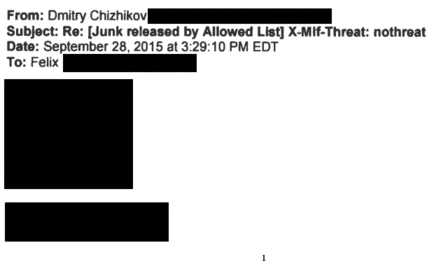
Below it is just Sater asking him to call him ASAP
9/29/15 -
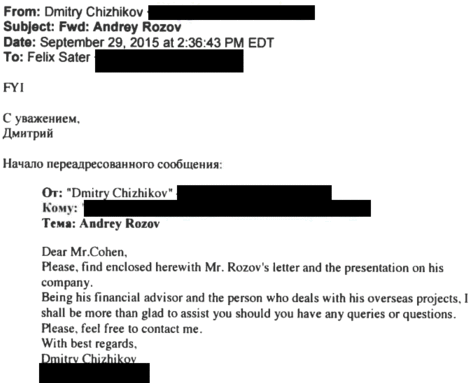
10/5/15 - It's an odd one
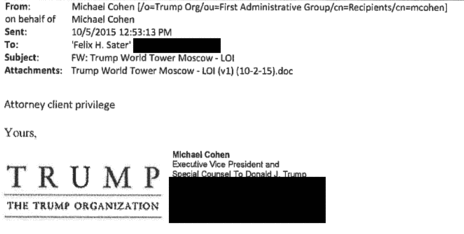
First LOI is sent with these licensing terms:
- upfront fee to Trump Org of $4mil
- 5% of gross sales rental units sold
- 5% of gross sales each parking unit sold
- 5% of gross sales other amenities: retail area, storage spaces, cabanas, memberships, etc.
10/8/15 - Another LOI sent with more refined and revised terms; more detail regarding who would have say over what as far as restaurants, decor, etc.
10/9/15 - Sater contacting Cohen regarding meeting with Andrey Molcharov and includes link to Forbes profile on Molcharov from 2008
Emails him link to this article minutes later:
LSR Group
10/12/15 - Cohen emails Sater link to this CNN video segment from the previous day in reply to this email from Sater. Cohen is being interviewed saying the media has been very dishonest and he's 100% confident Trump is taking the White House
CNN Video
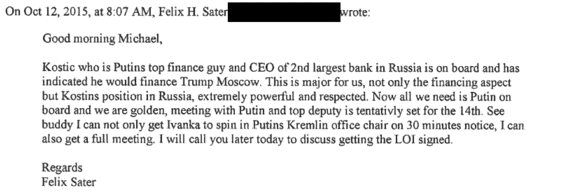
10/28/15 - Link to LOI Trump finally signed; same day of the 3rd Republican primary debate
LOI - Trump - IC Expert
Trump Tower Moscow Docs
Trump Tower Moscow Docs Rozov
9/25/15 - Cohen emails Sater a Trump World Moscow PDF with architectural designs of the planned skyscraper
9/28/15 - Dmitry Chikhikov emails Sater (redacted)

Below it is just Sater asking him to call him ASAP
9/29/15 -

10/5/15 - It's an odd one

First LOI is sent with these licensing terms:
- upfront fee to Trump Org of $4mil
- 5% of gross sales rental units sold
- 5% of gross sales each parking unit sold
- 5% of gross sales other amenities: retail area, storage spaces, cabanas, memberships, etc.
10/8/15 - Another LOI sent with more refined and revised terms; more detail regarding who would have say over what as far as restaurants, decor, etc.
10/9/15 - Sater contacting Cohen regarding meeting with Andrey Molcharov and includes link to Forbes profile on Molcharov from 2008
Emails him link to this article minutes later:
LSR Group
10/12/15 - Cohen emails Sater link to this CNN video segment from the previous day in reply to this email from Sater. Cohen is being interviewed saying the media has been very dishonest and he's 100% confident Trump is taking the White House
CNN Video

10/28/15 - Link to LOI Trump finally signed; same day of the 3rd Republican primary debate
LOI - Trump - IC Expert
Fastforward to Dec 2015 and we have Cohen getting mad at Sater writing this and then by the following month telling him they should communicate via
Dust
Source
Further down is the reference to using Dust
What isn't clear is what took place during the two-month gap between the signed LOI in Oct 2015 and Dec 2015, when Cohen is really (seemingly) fed up with Sater not moving the project along as far as finding a bank for funding which wasn't being sanctioned, when only the previous year in 2014 Sater seems to be the guy luring Russian spies with docs on sanctions after casino tours.
But what does seem clear is not long after that little exchange between them, Cohen has them move to more secure communications for unknown reason.
Cohen doesn't seem pleased it changed from a government invite, to VTB Bank, to the other bank.
Yet fast forward to less than a year later on Election Day 2016, and Sater and Cohen are both getting paid by BTA Bank to find lost Ablyazov money, and Cohen is also getting money from Columbus Nova, communicating with Andrew Intrater, who is Viktor Vekselberg's cousin. You can't make this stuff up.
Source
The following morning, New Year’s Eve 2015, he sent Cohen an image of a letter from GenBank — not VTB Bank, as they had earlier discussed — inviting the men to Moscow for a visit.
Just nine days earlier, the US Treasury Department had sanctioned GenBank for operating in Crimea after the disputed Russian takeover. GenBank became the first Russian financial institution to move into the Crimean peninsula.
Sater told Cohen that GenBank operates “through Putin’s administration and nothing gets done there without approval from the top. The meetings in Moscow will be with ministers — in US, that’s cabinet-level and with Putin’s top administration people. This likely will include Dmitry Peskov, Putin’s press secretary. To discuss goals, meeting agenda and meeting time between Putin and Trump.”
Cohen was incensed. “First it was a government invite, then VTB and then some third-rate bank signed by a woman Panamarova with no title. It’s like being invited by Independence Savings Bank. Let me do this on my own. After almost two months of waiting you send me some bull# letter from a third-tier bank and you think I’m going to walk into the boss’s office and tell him I’m going there for this? Tell them no thank you and I will take it from here.”
Sater: “Michael a lot of work has been done and it’s not a third-rate anything.”
Cohen: “We’re done. Enough. I told you last week that you thinking you are running point on this is inaccurate. You are putting my job in jeopardy and making me look incompetent. I gave you two months and the best you send me is some bull# garbage invite by some no name clerk at a third-tier bank. So I am telling you enough as of right now. Enough! I will handle this myself.”
He added, “Do you think I’m a moron? Do not call or speak to another person regarding MY project.”
Further down is the reference to using Dust
Sater has told investigators that during the first months of 2016, he and Cohen were using Dust, at Cohen’s suggestion, to communicate secretly about the Moscow project. Those messages, which were encrypted and are deleted automatically, have disappeared forever, Sater told BuzzFeed News. But on May 3, the day Trump won the Indiana primary and his top opponent Ted Cruz suspended his campaign, Sater sent Cohen an ordinary text message: “Should I dial you now?”
What isn't clear is what took place during the two-month gap between the signed LOI in Oct 2015 and Dec 2015, when Cohen is really (seemingly) fed up with Sater not moving the project along as far as finding a bank for funding which wasn't being sanctioned, when only the previous year in 2014 Sater seems to be the guy luring Russian spies with docs on sanctions after casino tours.
But what does seem clear is not long after that little exchange between them, Cohen has them move to more secure communications for unknown reason.
Cohen doesn't seem pleased it changed from a government invite, to VTB Bank, to the other bank.
Yet fast forward to less than a year later on Election Day 2016, and Sater and Cohen are both getting paid by BTA Bank to find lost Ablyazov money, and Cohen is also getting money from Columbus Nova, communicating with Andrew Intrater, who is Viktor Vekselberg's cousin. You can't make this stuff up.
Here's the response back via snail mail from the FOIA request I submitted to DIA regarding Sater.
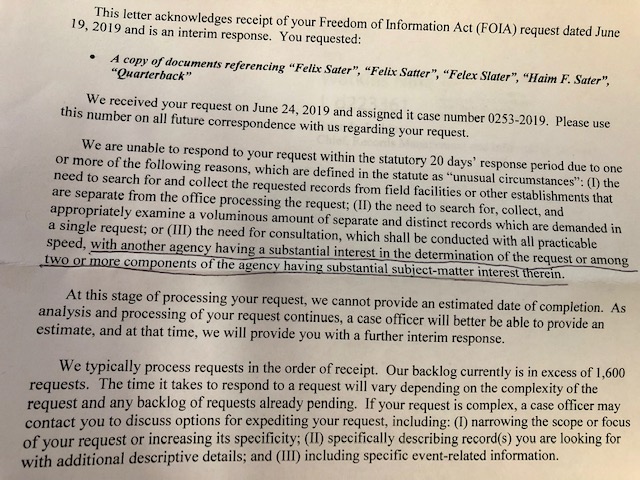
I'll try to get back to updating this thread later tonight or this weekend.
Sounds like it will be awhile...

I'll try to get back to updating this thread later tonight or this weekend.
Sounds like it will be awhile...
edit on 28-6-2019 by ucanthandlethetruth because: (no reason given)
I doubt there has ever been a thread like this on ATS and that makes me feel a little self-conscious. No, sir, no, I promise I'm not mentally insane.
This isn't just (mostly) pages and pages of me talking to myself.
Before I forget, I need to add a few more things about the Magnitsky film into this thread. They are noteworthy and I missed them along the way. This will happen more often than I'd like; too many intricate details and people and dates in this mess.
Why I'm hesitant to even attempt a cohesive book regarding Sater because he branches into so many other rabbit holes which are parts of this.
This article is dated 6/10/16, which would be the date after the Trump meeting which was regarding the Magnitsky Act and of course adoptions. Adoptions by American families of Russian children which were stopped by Russia in retaliation for the passage of the Magnitsky Act in 2012.
Foreign Policy
Further down
Last couple concluding sentences
Magnitsky Act 2 Min Trailer Vimeo
Full Movie imbedded on Swiss Propaganda Research site with these remarks...
Swiss Propaganda Research site - Magnitsky Act film
Interesting film. Watched it and I'll post on it tomorrow.
Before I forget, I need to add a few more things about the Magnitsky film into this thread. They are noteworthy and I missed them along the way. This will happen more often than I'd like; too many intricate details and people and dates in this mess.
Why I'm hesitant to even attempt a cohesive book regarding Sater because he branches into so many other rabbit holes which are parts of this.
This article is dated 6/10/16, which would be the date after the Trump meeting which was regarding the Magnitsky Act and of course adoptions. Adoptions by American families of Russian children which were stopped by Russia in retaliation for the passage of the Magnitsky Act in 2012.
Foreign Policy
A hedge fund manager’s reputation, U.S. sanctions targeting human rights violations in Russia, and the truth about how Sergei Magnitsky, a tax lawyer caught up in a $230 million dispute, wound up dead. So the story goes in Andrei Nekrasov’s new documentary, “The Magnitsky Act” — a film that’s been pulled thrice by European theaters and broadcasters who bent to legal pressure from the man it seeks to expose as a fraud. Next Monday, the Russian-born Nekrasov will finally get his chance to premiere it at the Newseum, a journalism history museum in Washington. Nekrasov is showing it to a private audience whose invitees include congressional staffers, State Department employees, members of the White House National Security Council, and journalists. Investigative reporter Seymour Hersh will moderate the screening.
Further down
Nekrasov told FP he set out to make a film based on Browder’s story that would be “a docu-drama praising Magnitsky.” Instead, he says close to two years of research led him to conclude that the conventional narrative was false. He said funding for the film came exclusively from mainstream western European organizations. Nekrasov’s film documents how he went from trusting Browder’s word to disbelieving it. The director says he began to doubt the hedge fund manager after reading the actual police reports in Russian. For example, Nekrasov argues that Magnitsky’s first contact with the police was not a voluntary act of whistleblowing, as Browder maintains, but a record of the police questioning him as a key witness in a tax evasion investigation.
Last couple concluding sentences
Nekrasov told FP that his experience dealing with Browder “has been a bit depressing, to be frank.” “What I discovered is how easy it is — if you have a lot of money — to basically gag somebody,” Nekrasov said.
Magnitsky Act 2 Min Trailer Vimeo
Full Movie imbedded on Swiss Propaganda Research site with these remarks...
Swiss Propaganda Research site - Magnitsky Act film
Movie director Andrei Nekrasov, a well-known Putin critic, wanted to film this story. But during the shooting he became increasingly doubtful: he realized that Magnitsky was not Browder’s lawyer, but his accountant, and that he was arrested not as a whistleblower, but as a suspect in the tax fraud allegedly organised by Browder himself. The final film traces this surprising turn of events. European TV channel ARTE, which had commissioned the original film, did no longer want to broadcast the final version. A screening at the European Parliament, on Press Freedom Day 2016, was cancelled at short notice, and a book on the case got censored by Amazon. In 2018, the film was eventually leaked. How did Magnitsky really die in Moscow prison, and where did the stolen tax money go? Through an aluminum-based poison by order of Browder, and partly into the election campaign of Hillary Clinton — the Putin government has claimed. Russian propaganda?
Interesting film. Watched it and I'll post on it tomorrow.
edit on 1-7-2019 by ucanthandlethetruth because: typo
What was interesting regarding this film is the fact it directly names Prevezon Holdings, the company in the Magnitsky case brought by Preet Bhahara,
which settled in 2017. The filmmaker who is himself no Putin fan, found himself wrestling with the story when many things just weren't adding up.
If you decide to watch it, you can really skip over the first 40 minutes or so as this was the telling of the officlal Browder narrative before the filmmaker Andrei Nekrasov is shown in the documentary asking himself questions. Then at least it's only a little over an hour to watch to get the picture.
***
All of the testimonies from the Trump Tower meeting are in regards to Magnitsky Act. This is the reason pretty much everyone involved on the Russian side of things thought they were attending the meeting. On the American side of things if you read the transcripts, they thought they were getting info on Hillary Clinton. Kind of how Steele was being paid by Fusion GPS who was being paid by DNC to find info on Trump around the same time. Except for on the Trump meeting comparison, no one was paying anybody. It was a Russian lawyer working on behest of her own company, being paid to work on the Prevezon vs. US. case since 2013, Natalia Veselnitskaya, who had been researching Browder and also working with Glenn Simpson of Fusion GPS on the same research on behalf of Prevezon. Glenn and Natalia both believe Browder's account of things is a bit skewed and fraudulent, yet we have countries around the world being lobbied to adopt it.
What is interesting to me is last year Putin accused Browder of being head of a crime family. Here's the scoop if you need a refresher. MSNBC Video - Putin Remarks Clip - Browder Interview Reaction
Browder mentions Putin also had stated his name in press conference when Canada passed their version of Magnitsky Act in 2017 (Oct). He said Putin went on a 5-minute tirade about him, so I had to dig this up to see it.
I don't know what to think.
There's two choices:
1. Bill Browder is telling the truth and his story is completely accurate and Putin is only trying to say these things because he's afraid of the Magnitsky Act's capabilities of freezing assets and travel to the West. So any money he or Russian or Ukrainian or even Kazakhstan Presidents like Nazarbayev have stashed in accounts/shell companies in the West would be open for seizure under these act.
2. Putin and filmmaker Andrei Nekrasov are telling the truth when they have poked holes in Browder's story. Perhaps he did make over a billion dollars in Russia and then not move it all to the US in the mid 2000s without paying tax in either country, while also assisting in perpretating a fraud on the Russian Treasury of 230 million dollars. After all, Browder's company took out insurance money for this fraud on Hermitage Capital before the fraud even occurred. If that's the case, then it would be embarassing for all of the countries buying into Browder's story without doing their own investigation.
If you decide to watch it, you can really skip over the first 40 minutes or so as this was the telling of the officlal Browder narrative before the filmmaker Andrei Nekrasov is shown in the documentary asking himself questions. Then at least it's only a little over an hour to watch to get the picture.
***
All of the testimonies from the Trump Tower meeting are in regards to Magnitsky Act. This is the reason pretty much everyone involved on the Russian side of things thought they were attending the meeting. On the American side of things if you read the transcripts, they thought they were getting info on Hillary Clinton. Kind of how Steele was being paid by Fusion GPS who was being paid by DNC to find info on Trump around the same time. Except for on the Trump meeting comparison, no one was paying anybody. It was a Russian lawyer working on behest of her own company, being paid to work on the Prevezon vs. US. case since 2013, Natalia Veselnitskaya, who had been researching Browder and also working with Glenn Simpson of Fusion GPS on the same research on behalf of Prevezon. Glenn and Natalia both believe Browder's account of things is a bit skewed and fraudulent, yet we have countries around the world being lobbied to adopt it.
What is interesting to me is last year Putin accused Browder of being head of a crime family. Here's the scoop if you need a refresher. MSNBC Video - Putin Remarks Clip - Browder Interview Reaction
Browder mentions Putin also had stated his name in press conference when Canada passed their version of Magnitsky Act in 2017 (Oct). He said Putin went on a 5-minute tirade about him, so I had to dig this up to see it.
I don't know what to think.
There's two choices:
1. Bill Browder is telling the truth and his story is completely accurate and Putin is only trying to say these things because he's afraid of the Magnitsky Act's capabilities of freezing assets and travel to the West. So any money he or Russian or Ukrainian or even Kazakhstan Presidents like Nazarbayev have stashed in accounts/shell companies in the West would be open for seizure under these act.
2. Putin and filmmaker Andrei Nekrasov are telling the truth when they have poked holes in Browder's story. Perhaps he did make over a billion dollars in Russia and then not move it all to the US in the mid 2000s without paying tax in either country, while also assisting in perpretating a fraud on the Russian Treasury of 230 million dollars. After all, Browder's company took out insurance money for this fraud on Hermitage Capital before the fraud even occurred. If that's the case, then it would be embarassing for all of the countries buying into Browder's story without doing their own investigation.
Here's the wording of the text on the Magnitsky Act - US Treasury
Source
What is kind of stunning to me is all based on this one case, Browder is lobbying and pushing for countries to pass this Act which says anyone can now be sanctioned if they are suspected of human rights abuses and their assets frozen and be unable to travel to the US/West. No proof of evidence needed (at least at first) to do this.

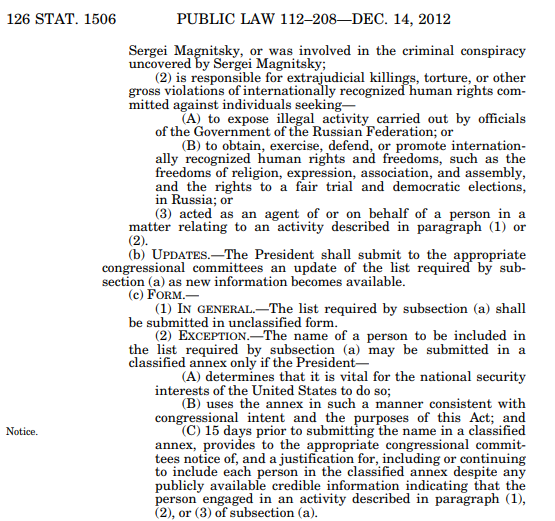
further down
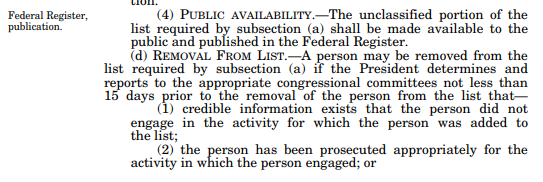
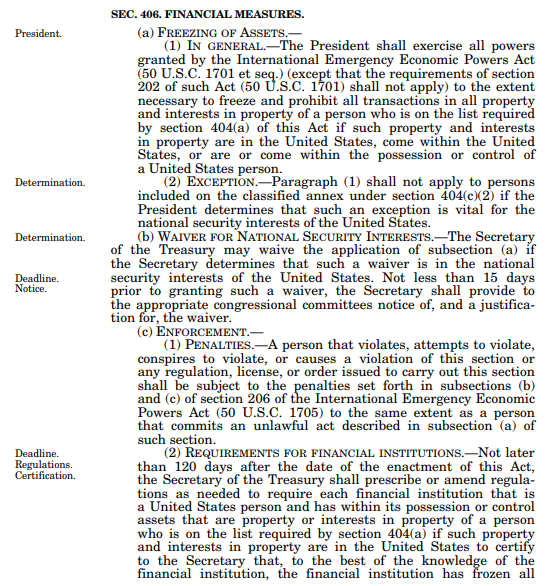
Now we have had prison inmates die under suspicious circumstances here. The notion an American could go to another country like the U.K. and lobby for them to pass an Act on this suspicious inmate's death accusing America of human rights violations and freezing any assets any American might have in their countries. Seems a little dramatic. Though it is more likely for oligarchs in Russia to have assets in the West, than an American prison guard having assets in the U.K. But hopefully you get my point. If the foundation of this story is false, it's not a great thing... politically.
Source
What is kind of stunning to me is all based on this one case, Browder is lobbying and pushing for countries to pass this Act which says anyone can now be sanctioned if they are suspected of human rights abuses and their assets frozen and be unable to travel to the US/West. No proof of evidence needed (at least at first) to do this.


further down


Now we have had prison inmates die under suspicious circumstances here. The notion an American could go to another country like the U.K. and lobby for them to pass an Act on this suspicious inmate's death accusing America of human rights violations and freezing any assets any American might have in their countries. Seems a little dramatic. Though it is more likely for oligarchs in Russia to have assets in the West, than an American prison guard having assets in the U.K. But hopefully you get my point. If the foundation of this story is false, it's not a great thing... politically.
new topics
top topics
-
Let's talk planes.
General Chit Chat: 16 hours ago, 5 flags
active topics
-
Gravitic Propulsion--What IF the US and China Really Have it?
General Conspiracies • 19 • : fringeofthefringe -
January 6th report shows disturbing trend (nobody is shocked)
US Political Madness • 60 • : fringeofthefringe -
RFK JR endorses Trump
2024 Elections • 47 • : fringeofthefringe -
The Truth about Migrant Crime in Britain.
Social Issues and Civil Unrest • 19 • : BernnieJGato -
OK this is sad but very strange stuff
Paranormal Studies • 9 • : charlyv -
Meta Llama local AI system is scary good
Science & Technology • 43 • : Arbitrageur -
Musk calls on King Charles III to dissolve Parliament over Oldham sex grooming gangs
Mainstream News • 199 • : yeahright -
Judge rules president-elect Donald Trump must be sentenced in 'hush money' trial
US Political Madness • 38 • : network dude -
Greatest thing you ever got, or bought?
General Chit Chat • 23 • : DAVID64 -
ILLUMINATION: Dimensions / Degrees – Da Vincis Last Supper And The Philosophers Stone
Secret Societies • 12 • : Compendium
